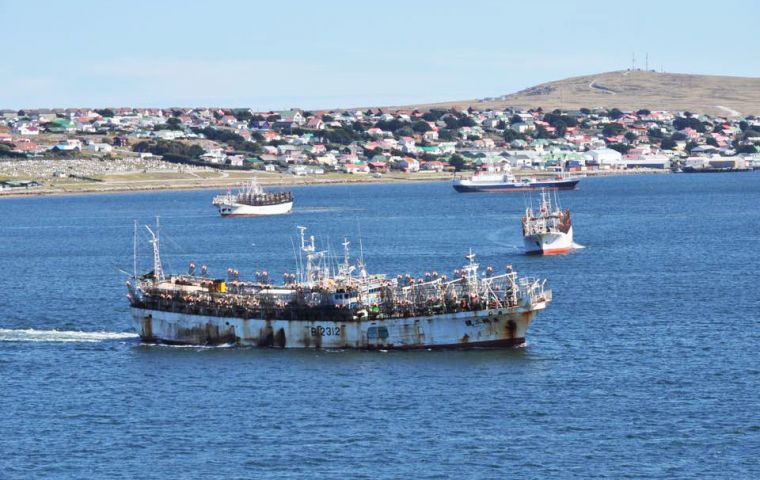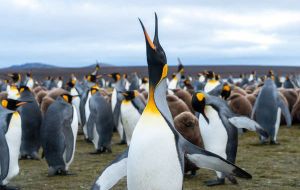MercoPress. South Atlantic News Agency
Brexit concerns blowing gale across nervous Falklands
 Fishing accounted for 43% of the Falklands GDP from 2007-16 and nearly all its exports in 2018 went to the EU.(Pic R. Goodwin)
Fishing accounted for 43% of the Falklands GDP from 2007-16 and nearly all its exports in 2018 went to the EU.(Pic R. Goodwin)  Falklands' two main exports - fishing and meat - could be adversely affected by a “No Deal” Brexit or even a bad deal, says MLA Leona Roberts
Falklands' two main exports - fishing and meat - could be adversely affected by a “No Deal” Brexit or even a bad deal, says MLA Leona Roberts  Esther Bertram, who leads the Falklands Conservation NGO, says Britain must take responsibility for the wildlife in its overseas territories.
Esther Bertram, who leads the Falklands Conservation NGO, says Britain must take responsibility for the wildlife in its overseas territories.  “It can be forgotten that we are where the most fabulous of the UK's wildlife is,” she told AFP.
“It can be forgotten that we are where the most fabulous of the UK's wildlife is,” she told AFP. The following piece on the Falklands and Brexit was distributed by the French news agency, AFP, both in English and Spanish. - It may be a remote archipelago 13,000km from mainland Britain but the Falkland Islands' incredible biodiversity, as well as fishing and meat exports, are under threat from Brexit.
While Prime Minister Boris Johnson's government and the European Union squabble over Brexit, conservationists in the Falklands - a British overseas territory of 3,400 inhabitants - are anxiously following events as they run the risk of losing significant EU funding.
Esther Bertram, who leads the Falklands Conservation NGO, says Britain must take responsibility for the wildlife in its overseas territories.
“It can be forgotten that we are where the most fabulous of the UK's wildlife is,” she told AFP.
”We have endangered sei whales visiting here; we have the largest populations of a whole range of species: black-browed albatrosses, we have five (species of) penguins that you can trip over, we have elephant seals sprawling; it's a phenomenal natural environment.”
The windswept British outpost in the South Atlantic has received 600,000 euros (US$660,000) in funding from the EU's Biodiversity Ecosystems Services in Territories of European overseas (BEST).
Some 90 per cent of the United Kingdom's biodiversity is found in overseas territories, according to the Falklands government.
Bertram, 45, wants to know how that financing shortfall will be made up after Oct 31, Johnson's deadline for leading Britain out of the bloc.
“Going forwards, there's been no reassurance that we'll be able to have any access to EU funding,” she said, adding that London needs to take responsibility “for its wildlife in the overseas territories as much as it does anywhere else.”
The Falklands' two main exports - fishing and meat - could be adversely affected by a “No Deal” Brexit or even a bad deal, says Leona Roberts, a member of the Falklands' eight-strong elected Legislative Assembly.
Fishing accounted for 43 per cent of the Falklands GDP from 2007-16 and nearly all its exports in 2018 went to the EU.
“We currently benefit from a tariff-free and quota-free access for that product and if that changes, of course, we could find ourselves in a very difficult situation with government revenue dropping considerably,” said MLA Roberts, who holds the portfolio for policy and public relations.
World Trade Organization tariffs range from six to 18 per cent, and a “no deal” departure could see fishing revenue drop by 16 per cent, the government estimates.
The meat industry, run mostly by family-owned farms, could also face a significant impact even though most Falklands beef and lamb is exported to Britain.
“There's a potential knock-on effect there as well, if tariffs and quotas are introduced,” said Roberts.
If less UK-produced meat is sold to the other EU countries, then mainland Britain would need to import a smaller amount from the Falklands.
“If less meat is being produced for sale overseas, there is the risk of job losses,” said Roberts. The Falklands government estimates that its meat could be subject to 12.8 per cent tariffs, plus a charge of 155.68 euros per 100kg exported, leading to annual losses of up to 30 per cent.
As a British overseas territory, the Falkland Islanders did not get to vote in the Brexit referendum.
The Islands are not even part of the UK - and hence not part of the EU - but as an overseas territory they benefit from the customs union.
One area less likely to be affected is the Falklands' raw wool sector, which is not subject to tariffs. There are around half a million sheep on the Falklands, spread across 92 farms.
“There are no signals coming out that wool will be affected at all,” said Keith Alazia, the manager at Goose Green farm on West Falkland island.
But locals have a variety of other concerns.
”There's been talk about ... (how) our medicine is going to be affected because we won't get all the medicine we need and it will be more expensive,“ said 27-year-old Joanne Baigorri, a credit officer at the Falklands' only bank.
Gabi McRae, a Chilean who works in quality control at the Falkland Islands Meat Company, has already noticed the effect of a weakening pound.
”In the first few years when I did the exchange, one pound was equal to 1,000 Chilean pesos. Now it's just 600-700,“ said the 31-year-old.
MLA Roberts, though, feels that whatever happens, the Islanders' ”natural sort of pragmatism and sense of spirit” will help them find a way to survive.




Top Comments
Disclaimer & comment rules-

-

Read all commentsSTINK They the FALKLANDERS WILL be ok, STINK of ALL that “ Black Gold ” under the FALKLANDS and what a boost for the Oil Companies to hear the FALKLANDERS are concerned about their revenue. Obviously there will be an excelleration in their plans to extract the oil.
Oct 17th, 2019 - 09:13 am +1TWIMC...
Oct 17th, 2019 - 08:42 am -1***“Falklands' two main exports - fish and meat - could be adversely affected by a “No Deal” Brexit or even a bad deal, says MLA Leona Roberts...”***
“COULD”...???
“WILL” is the appropriate Engrish word to use here..., me dear Shilean Leona...
Commenting for this story is now closed.
If you have a Facebook account, become a fan and comment on our Facebook Page!